

 |
BELARUS |
1 SEPTEMBER:
Reclaim the Castle & the Family
VILNIUS I had an easy morning in Vilnius, re-visiting the narrow alleys of the city again. I walked up Castle Hill, and admiring Vilnius’s skyline from its “summit”. The serenity of the place was upset when an extended family of four smoky adults and five screaming kids arrived. As the smoke-hating fascist I am, I wished I was on the main street of Kaunas. It was still an hour away before the Castle Museum opens but I decided it wasn’t worth braving the pollution for a few cannons and armour pieces, or worse, committing a serial murder in a fit of anger. I decided to visit the National Museum instead and tried to take a short cut down the slopes of Castle Hill, only to find myself trapped embarrassingly between some rocks and an iron fence. It wasn’t without great effort that I managed to return to the longer but certainly safer path downhill.
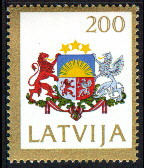 treasure-house
of anything Lithuanian, but unfortunately everything is in Lithuanian.
Obviously, international tourism hasn’t made an impact significant enough
to introduce captions in English. It wasn’t long before I got bored
with yet another national costume and folk instrument that I decided to
return to the Old Town.
treasure-house
of anything Lithuanian, but unfortunately everything is in Lithuanian.
Obviously, international tourism hasn’t made an impact significant enough
to introduce captions in English. It wasn’t long before I got bored
with yet another national costume and folk instrument that I decided to
return to the Old Town.
I had coffee at a café along the Pilles, watching students preparing for some start-of-term ceremony at the Vilnius University nearby. Trendy ladies strolled passed with their Giogio Armani’s and Saatchi’s. Hawkers touting amber necklaces and assorted pot-pourri. A twelve year old spoke to me in English, asking me to donate to a fund in support of a “wholesome family”. “Too many married couples are breaking up, and hurting the children. We want to support a family based on love and harmony, “ she said.
“Good idea. But what can you do to help with my money ?”
She couldn’t answer my question. A pity, and there goes my donation. Divorces are on the rise everywhere, but what struck me is that people tend to marry early in the FSU – between 18 and 22 years old, to their first loves, and by 26 they are divorced with a kid. The fall of the USSR and the poverty merely made things worse…
Another cup of coffee and I was prepared to brave Belarus. I returned to Hotel Gintaras, collected my luggage and went to the Bus Station, where curious bystanders shouted at me “Kazaksky ? Kazaksky ?” thinking that I was Kazak. Made me feel like a zoo creature surrounded by idiotic visitors. The bus ticket cost 18.80 Lt. Vilnius – Minsk in Russian, the bus indicated. It was full of Belarusians with their shopping bag. Not entirely confident about my Russian, I asked an elderly lady with bony face. “Minsk, Belarus ?”
She didn’t seemed to understand. Perhaps I mispronounced the name. I repeated.
“Da, da. Minsk. Belorossiya.” She used the old Russian name, Belorussia. In 1991, during the euphoria of independence, Belarus would have been the politically correct name. But after Alexandr Lukashenko was elected president in 1994, the country has turned back the clock of progress. The new president has declared the Belarusian language the peasant’s language, and tried hard to revive the Soviet Union. Belorussia, meaning White Russia, is in vogue again.
I got a little excited as the bus sped towards the border. Many
have warned me about the corrupt Belarus officials. Latvia and Lithuania
are countries on the way to become part of Europe and destiny has been
kind to me so far. However, the real adventure would soon begin.
Belarus or Belorussia, White Rus or White Russians
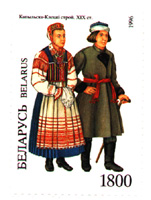 Belarus
has never been a single independent political entity until the modern times.
The Slavic tribes settled here more than a thousand years ago and set up
small states subject to the Empire of the Kyivian Rus, based around Kiev
(or Kyiv), today capital of Ukraine. This was the first Eastern Slavic
state, and a powerful empire that stretches from the rolling hills of Bukovina
on Ukraine’s border with Romania, to the fur-collecting villages near the
White Sea, near today’s Finnish border with Russia. Kyivian Rus fell
apart when the Mongol hordes sacked Kiev and numerous other cities of the
Rus. The division of the Slavic lands led to the emergence of three
more or less distinct Slavic races – the Russians, Ukrainians and the Belarusians.
Belarus
has never been a single independent political entity until the modern times.
The Slavic tribes settled here more than a thousand years ago and set up
small states subject to the Empire of the Kyivian Rus, based around Kiev
(or Kyiv), today capital of Ukraine. This was the first Eastern Slavic
state, and a powerful empire that stretches from the rolling hills of Bukovina
on Ukraine’s border with Romania, to the fur-collecting villages near the
White Sea, near today’s Finnish border with Russia. Kyivian Rus fell
apart when the Mongol hordes sacked Kiev and numerous other cities of the
Rus. The division of the Slavic lands led to the emergence of three
more or less distinct Slavic races – the Russians, Ukrainians and the Belarusians.
The Lithuanians soon replaced the Mongols, and this land came to be known as Lithuania as well. Lithuanians, being a small pagan tribe taking over a larger and even religiously more developed civilisation, readily accepted Belarusian as a language of state. However, when Lithuania merged with Poland, Belarusian descended to become a peasant tongue. The nobility converted to Roman Catholicism and became polonised language and culture, while the peasants, now turned serfs by regressive agricultural reforms, remained Belarusian and Orthodox. In the 18th century, the expanding Russian Empire gained control of all Belarus.
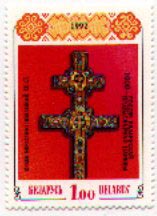 Tsarist
Russia began the process of intensive russification. To the Tsars,
the natives were known as Belarussians - White Russians – meaning a kind
of western Russians, rather than Belarusians - People of the White Rus,
which highlights the Kyivian Rus heritage of the Belarusians as well as
their separateness from the other descendant nations of the Kyivian Rus.
(White probably refers to the people’s pale complexion, or their generally
white local costume.) The difference may sound superfluous, but it
is a matter of great emotions, and who knows, life and death, or peace
and war, in some time in the future.
Tsarist
Russia began the process of intensive russification. To the Tsars,
the natives were known as Belarussians - White Russians – meaning a kind
of western Russians, rather than Belarusians - People of the White Rus,
which highlights the Kyivian Rus heritage of the Belarusians as well as
their separateness from the other descendant nations of the Kyivian Rus.
(White probably refers to the people’s pale complexion, or their generally
white local costume.) The difference may sound superfluous, but it
is a matter of great emotions, and who knows, life and death, or peace
and war, in some time in the future.
Came the WWI and Belarus was occupied by the Germans. The short-lived Belarusian Democratic Republic was declared, but with the collapse of Germany at the end of the war, Belarus was torn into two, the western part occupied by the Poles, and the eastern part by the young Soviet state. The Belorussian Soviet Socialist Republic was declared. The country underwent further russification.
Then the Germans invaded again during WWII. This time, the war machinery of Hitler’s Germany was bent on making the Slavic lands Germany new living space. Natives were to be enslaved or exterminated. The German occupation, together with the subsequent re-conquest by the Soviets wiped out a quarter of Belarus’s population and most of its cities. Today, the cities, towns and villages of Belarus are full of memorials to this period of enormous suffering and personal sacrifices. After the war, Belarus was reconstructed as the model republic, with massive investments in heavy industry, in particular, trucks and electronics. This enabled the republic to become one of the richest in the USSR and one of the most contented one.After a few hundred years of russification and decades of comfortable Soviet welfare system and state planning, the Belarusians were suddenly confronted with the collapse of the USSR. In August 1991, the Supreme Soviet, or Parliament, was forced by the sudden turn of events to declare independence as the Republic of Belarus. The ancient arms of Belarus-Lithuania, The Knight, was reinstated, together with the white-red-white striped flag. The euphoria of independence soon gave way to disillusionment and nostalgia as inflation and unemployment overwhelmed the country.
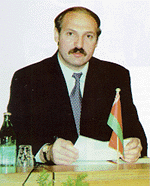 In
1994, Lukashenko was elected president on the platform of union with Russia.
A former collective chicken farm manager, Lukashenko swiftly turned back
the already slow progress of economic reform. He re-nationalise banks
and factories, signed a treaty of union with Russia (with the intention
of running for Russian presidency after Yeltsin's retirement), restoring
the Soviet emblems of the old Belorussian Soviet Socialist Republic, and
his most remarkable achievement - the depreciation of the Belarus Ruble
from 2 to 340,000 to US$1, i.e., 15,000,000% devaluation !
On the black market, the Rube is worth 460,000 to US$1. When people
get sick of him and his fuzzy economics, he simply announced that no elections
would be held and opposition leaders began to disappear. Even his estranged
wife has been exiled to an obscure rural part of the country, passing time
milking cows, and warned not to tell outsiders too much. He got so
paranoid with the opposition and foreign criticism that he even shot down
an American balloon that strayed across the border by mistake (and killing
a few sportsmen in the process) and closing down foreign embassies in Minsk.
Foreign visitors are equally suspect and Belarusian visa applications are
among the most tedious and expensive in the world. The grapevine
of the backpacking traveller is full of warnings about the Belarusian custom
officer, the most corrupt and troublesome of its kind anywhere. What
an exciting time to arrive in Belarus !
In
1994, Lukashenko was elected president on the platform of union with Russia.
A former collective chicken farm manager, Lukashenko swiftly turned back
the already slow progress of economic reform. He re-nationalise banks
and factories, signed a treaty of union with Russia (with the intention
of running for Russian presidency after Yeltsin's retirement), restoring
the Soviet emblems of the old Belorussian Soviet Socialist Republic, and
his most remarkable achievement - the depreciation of the Belarus Ruble
from 2 to 340,000 to US$1, i.e., 15,000,000% devaluation !
On the black market, the Rube is worth 460,000 to US$1. When people
get sick of him and his fuzzy economics, he simply announced that no elections
would be held and opposition leaders began to disappear. Even his estranged
wife has been exiled to an obscure rural part of the country, passing time
milking cows, and warned not to tell outsiders too much. He got so
paranoid with the opposition and foreign criticism that he even shot down
an American balloon that strayed across the border by mistake (and killing
a few sportsmen in the process) and closing down foreign embassies in Minsk.
Foreign visitors are equally suspect and Belarusian visa applications are
among the most tedious and expensive in the world. The grapevine
of the backpacking traveller is full of warnings about the Belarusian custom
officer, the most corrupt and troublesome of its kind anywhere. What
an exciting time to arrive in Belarus !
My Kitten, I Want You !
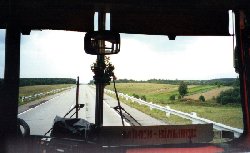 LITHUANIAN-BELARUSIAN
BORDER The border crossing was an anti-climax.
I have arrived at the Belarusian post with the anxiety of a well-prepared
student all ready to take a difficult examination. Most seasoned
travellers and aspiring travel writers look forward to nasty border experiences
they can boast about upon their return. It should be difficult and
eventful, but preferably not an overly time consuming one or so excessively
unpleasant as to remove all the fun. Of course, nothing too
dangerous, although a hint of danger is certainly desirable to make the
story more exciting.
LITHUANIAN-BELARUSIAN
BORDER The border crossing was an anti-climax.
I have arrived at the Belarusian post with the anxiety of a well-prepared
student all ready to take a difficult examination. Most seasoned
travellers and aspiring travel writers look forward to nasty border experiences
they can boast about upon their return. It should be difficult and
eventful, but preferably not an overly time consuming one or so excessively
unpleasant as to remove all the fun. Of course, nothing too
dangerous, although a hint of danger is certainly desirable to make the
story more exciting.
The examination took only ½ hour, most of which spent on looking for someone who knew enough English to help me fill up the customs declaration form, which was in Russian. Without this exotic non Russian-speaking troublemaker from the Far East, the bus would have left the post within ten minutes. I must be one of the few exotic creatures to have crossed this border and several friendly officials crowded round to watch this unusual zoological specimen, and the somewhat pseudo-English speaking officer’s attempts to translate blanks on the customs form into English. Most of them seemed to have great fun, although the officer was embarrassed that he, supposedly English speaking, was having a difficult revision exercise.
Eventually the task was done and with a chorus of spahsiba, I bid farewell. Who knows, if I had stayed longer, glasses of vodka will be passed around together with ritual toasting of health and god knows what. Yes, an anti-climax. No nasty officers and no five-hour traffic congestions. But at least, I know that Belarusian officers can be friendly as well.
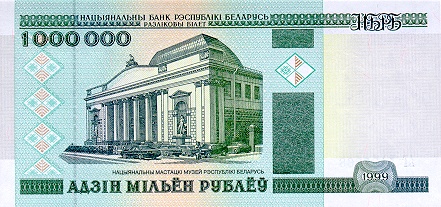 Belarusian
Banknote - 1,000,000 Belarusian Rubles - I am rich !
Belarusian
Banknote - 1,000,000 Belarusian Rubles - I am rich !
The first stop was Osmany, a small city close to the border. Here, it became almost immediately evident that one had entered a kind of Soviet Disneyland, or that one had travelled on a time machine back time, instead of a bus journey just across the Lithuanian border. Merely a few hours ago, I was in an almost westernised Lithuania, where Eurospeak is in vogue and where Gucci compete Christian Dior. Here, the slogans and banners of Internationale and Lenin still reign, and First Republican Blouse Factory competes with Lenin Fabrics Number Two Plant, so to speak. Run-down houses and unpainted apartment blocks interspersed with green folds of vegetable plots in between. Huge rubbish dumps at an alternate street corner, while a huge statue of Lenin pointed the way forward in front of the city hall, the only decently maintained building in town. Lenin would be proud of the mayor. Immediately upon arrival at Osmany bus station, black marketeers boarded the bus offering to sell Belarus ruble for 460,000 BR for US$1. The official rate is about BR 340,000. I changed US$10. The pretty boy behind me shaked his head, smiling, either mocking the silly foreigner who traded for so much of this useless toilet paper, or perhaps expressing a sense of helpless resignation at the state of his motherland. Probably both.
As the bus sped towards Minsk, the pine trees and rolling hills of southeastern Lithuania transformed into flat plains alternated by occasional groves of birch trees and little rivers. This is timeless Belarus, the land of Marc Chagall. Ever since I saw a poster of Chagall’s exhibition in Jerusalem, those wooden houses a la Chagall, together with the flying farmers, village girls and cows have occupied a corner of my sub-conscience. Perhaps, I should have tried harder for a full Belarus visa, rather than a transit one that allows me merely 48 hours’ stay in this country.
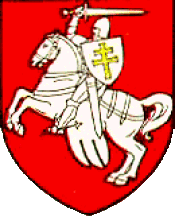 Pahoria
or rider (similar to Lithuania's): The old coat of arms that was gotten
rid of.
Pahoria
or rider (similar to Lithuania's): The old coat of arms that was gotten
rid of.Can’t You Read The Menu, Dumb Foreigner !
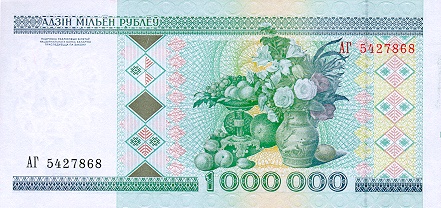 MINSK
I arrived in Minsk at 7pm local time. It was getting
dark and I found myself in an awfully dull city with huge unmistakably
Stalinist architectural jewels. Totally destroyed during WWII, it
was rebuilt with huge Stalin’s favourite communist baroque, imaginatively
decorated with so many People’s Icons – hammer and stickle, portraits of
dear old Archangels chubby beardy Marx and thinner but equally beardy
Engels, and of course God Lenin, all inspiring the pious Working Class,
i,e., the Holy Trinity of the Peasant, Worker and the Holy Soldier, towards
achieving heavenly Communist Utopia. Of course, in forever devoted,
pious, loyal, godfearing (I mean Leninfearing) Belorossiya, these Holy
Symbols were preseved, unlike the disgusting, disgraceful and blasphemous
behaviour manifested by iconoclastic hordes in neighbouring previously
brotherly nations of this once-happy Soviet family. May Holy Lenin
and the blessed martyrs of Beria and Saintly Family Ceausescus damn them
in forever-burning hell of capitalism. Perhaps, pious, loyal dear
Comrade-Brother Lukashenko will bring light to the temporarily lost, prodigal
sons, and bring them back to Socialist Light.
MINSK
I arrived in Minsk at 7pm local time. It was getting
dark and I found myself in an awfully dull city with huge unmistakably
Stalinist architectural jewels. Totally destroyed during WWII, it
was rebuilt with huge Stalin’s favourite communist baroque, imaginatively
decorated with so many People’s Icons – hammer and stickle, portraits of
dear old Archangels chubby beardy Marx and thinner but equally beardy
Engels, and of course God Lenin, all inspiring the pious Working Class,
i,e., the Holy Trinity of the Peasant, Worker and the Holy Soldier, towards
achieving heavenly Communist Utopia. Of course, in forever devoted,
pious, loyal, godfearing (I mean Leninfearing) Belorossiya, these Holy
Symbols were preseved, unlike the disgusting, disgraceful and blasphemous
behaviour manifested by iconoclastic hordes in neighbouring previously
brotherly nations of this once-happy Soviet family. May Holy Lenin
and the blessed martyrs of Beria and Saintly Family Ceausescus damn them
in forever-burning hell of capitalism. Perhaps, pious, loyal dear
Comrade-Brother Lukashenko will bring light to the temporarily lost, prodigal
sons, and bring them back to Socialist Light.
I went straight to Svisach Hotel, a huge building so typical of the 1930’s Stalinist Baroque. I shouldn’t complain. I secured a double room with ensuite toilet and bath for only US$16.50 per night. The location was central – it lies on Kirava, near the heart of town, i.e., the area around Independence Square ( - I suppose Lukashenko disapprove of this name), Karl Marx Street and Lenin Street.
Here, I suppose Lenin’s How Business Should Be Operated handbook (or
whatever the equivalent) is still the standard textbook for management
courses:
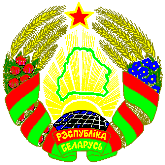 Lukashenko's
New Coat of Arms.
Lukashenko's
New Coat of Arms.
Of course, Lukashenko’s Belarus did make some slight changes. At least, the customer pays the Comrade Shopgirl. One no longer need to pay at yet another counter... like what I did in Central Asia last year.
Rule Two: Screw Comrade Customer if he is indeed proven dumb. Or screw him anyway. That was what I was to experience.
Hungry, I went to a restaurant across the hotel. In this noisy crowded establishment, I was handed a Russian language menu by a fierce-looking basbushka.
“Ya Ni Gava Ru Par Ruski” I told her I can’t speak Russian and asked for an English menu. “Mi-nyu Anglisky ?”
The blond haired granny stared hard at me and gave me that “More ? More !” look little Oliver Twist received when he asked for more soup. Then out came a barrage of sharp Russian abuse. Everyone in the restaurant turned to look at this uncivilised oriental who was simply not educated enough to speak the beautiful language of Alexander Pushkin and Lev Tolstoy. How atrocious ! Of course, the outraged’s colleagues came to cool her down. Why get yourself upset over a less cultured creature ?
To make things simple, I asked for the trademark Russian dishes. “Borshch. Kahtletuh pa-Kievsky” Beetroot soup and Chicken a la Kiev.
After forty minutes, these were delivered. I had the pleasure to discovered that the soup was cold. I have never tasted cold Borshch and with my phasebook, I tried to make my preference known to Lady Not-So-Nice in basic broken Russian. “Borshch kha-lodnii nyet. Pazhalusta.” I said in my broken, pseudo Russian – No cold soup, please. “Borshch tyoplii. Pazhalusta.” Warm soup, please.
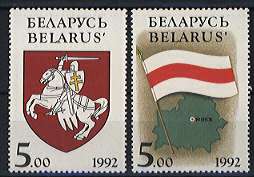 She
stared at me, and then screamed. I must have committed a terrible
crime. Everybody looked at me. Her colleagues ran out, and
again, calmed her down. One kind lady tried to explained the situation
to me, unfortunately, in Russian. She might as well did that in Maya
or Martian-speak. I was afraid they were going to do that have-that-or-none
trick, but thankfully, the soup was replaced with chicken soup, which,
thankfully, was warm. Disaster, or even murder of a foreigner, was
averted. Everybody there was relieved but gave me that you-naughty-boy
look. I can no longer remember how that bowl of chicken soup tasted.
She
stared at me, and then screamed. I must have committed a terrible
crime. Everybody looked at me. Her colleagues ran out, and
again, calmed her down. One kind lady tried to explained the situation
to me, unfortunately, in Russian. She might as well did that in Maya
or Martian-speak. I was afraid they were going to do that have-that-or-none
trick, but thankfully, the soup was replaced with chicken soup, which,
thankfully, was warm. Disaster, or even murder of a foreigner, was
averted. Everybody there was relieved but gave me that you-naughty-boy
look. I can no longer remember how that bowl of chicken soup tasted.
![]() 2 SEPTEMBER: MINSK: Spy Chief, the President and a President’s Assassin
2 SEPTEMBER: MINSK: Spy Chief, the President and a President’s Assassin
| RETURN TO FROM THE BALTIC TO THE BLACK SEA HOMEPAGE |